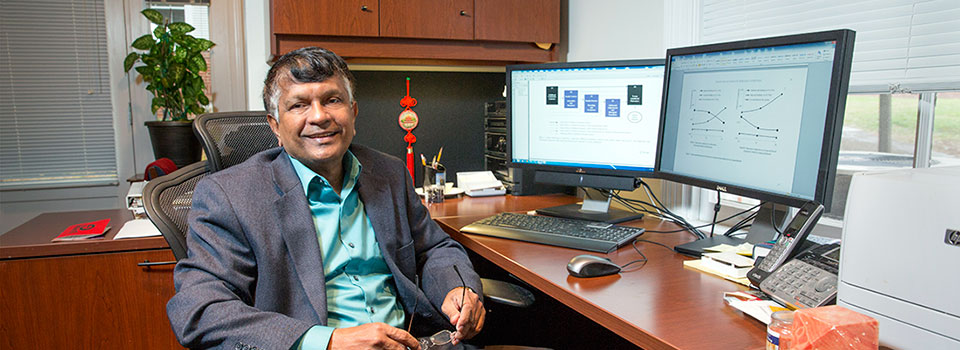Kandauda (K.A.S.) Wickrama, a Georgia Athletic Association Professor in Family and Consumer Sciences, brings his research experiences to the courses he teaches, but he also learns from his students, who shape his research questions through their classroom discussions.
Where did you earn degrees and what are your current responsibilities at UGA?
I earned my bachelor’s degree in chemistry from the University of Sri Lanka before going on to post-graduate studies in soil science at the Agricultural University of Norway. I did advanced studies in rural and community planning at the University of Sussex and the University of Reading, United Kingdom, before earning my Ph.D. in sociology from Iowa State University.
When did you come to UGA and what brought you here?
I came to UGA in 2011 and was attracted by the research facilities and prominent social science and family researchers—as well as by Athens’ weather.
What are your favorite courses and why?
I enjoy teaching “Application of Advanced Quantitative Methods in Social and Behavioral Research” as well as “Life Course Social Epidemiology.” I am able to bring my research experiences and findings to the classroom when I teach these courses.
What interests you about your field?
My field is applied. I am producing new knowledge about social determinants of health that can be used for people’s health and well-being, particularly disadvantaged people.
What are some highlights of your career at UGA?
My favorite moments included developing and proposing the Graduate Quantitative Certificate Program for Family Science, being named Georgia Athletic Association Professor of Family and Consumer Sciences and receiving a grant from National Institute on Aging for a project titled “Couple Relationships and Health during Transition to Later Adulthood.” The $2.5 million grant is for the five-year period from 2014-2019.
How does your research or scholarship inspire your teaching, and vice versa?
I bring my research experiences and findings to the classroom; at the same time, I generate new hypotheses/research questions through discussions with students that can be tested in my research. These are reciprocal processes.
What do you hope students gain from their classroom experience with you?
I hope students gain experience in scientific thinking, generating testable research questions, developing research designs and measurements, and acquiring cutting-edge analytical techniques.
Describe your ideal student.
My ideal student is one who is conversant with the contemporary theories, the exciting research literature, quantitative and qualitative analytical techniques and the application of this knowledge and these skills in research.
Favorite place to be/thing to do on campus is…
The Ramsey Student Center for Physical Activities.
Beyond the UGA campus, I like to…
Go grocery shopping in international markets in Atlanta.
Community/civic involvement includes….
Volunteering as consultant for mental health projects for tsunami victims in Sri Lanka.
Favorite book/movie (and why)?
“12 Years A Slave.” This film provides a socioeconomic perspective on the 19th and early 20th century. It suggests some historical factors contributing to the present sociopsychological and health disadvantages of the African-American population.
Proudest moment at UGA?
Receiving an R01 grant award from National Institute on Aging of the National Institutes of Health to study baby boomers’ marital relationships and health during their transition to later adulthood. There is a large cohort of baby boomers in the United States entering their elder years, and they will experience many health problems. It’s very important that we study this group of people.
Originally published Dec. 14, 2014
